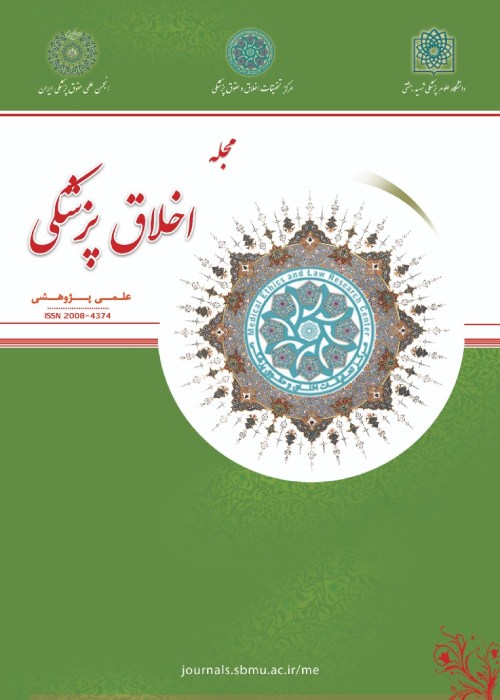Study of obstacles and musts of obtaining informed consent in organ donation
Author(s):
Article Type:
Research/Original Article (دارای رتبه معتبر)
Abstract:
Background And Aim
Informed consent is of important moral rules of medicine that paying attention to it before starting every diagnostic or therapeutic procedure facilitates therapy and care process. Informed consent includes having decision making competence, suitable relationship with patient and providing information, understanding them, voluntarily and signing testimonial form. Consent and awareness are two important elements in obtaining informed satisfaction. Statistics show that however there increases a disproportion among available member's numbers for grafting and patients, who are waiting for graft, consent for organ donor remains fixed and insufficient. Thousand persons die because of lack of grantable organs, yearly. According to the fact that multiple factors have a role in obtaining the consent for organ donor, this study was performed by the aim of investigating obstacles and musts of informed consent in organ donation.Materials And Methods
In this review, systematic search for English articles, having complete and available context, was done by keywords such as "organ donation" and "informed consent" in PubMed, Science direct and Google scholar database. Also, final resource of articles were evaluated in order to add articles which were eligible for entering but were not obtained in preliminary search. Search was done by first author and then was evaluated and confirmed by second author. In searching and selecting articles, no limitation was applied in terms of type and quality of study. During the search, 126 articles were recovered. 100 articles were deleted because of non-relatedness abstract and because of duplication and 10 articles also were deleted after studying compete context. Finally, among 126 finding articles, 16 related articles were studied and analyzed.Ethical considerations: Integrity and honesty in reporting, documenting and citing of resources, not to distort and manipulate in findings and their report based on scientific content and abstinence of bias were observed.
Findings: Musts of obtaining informed consent were categorized into two groups related to donor and related to consenter and medical personnel. Most of studies knew informing of donation risks, assurance of competence and decisiveness of organ donor of related cases to donor. Complete medical evaluation, giving information and creating enough understanding are of the related cases to consenter. Obstacles are in three groups related to donors, their family and concenter.
In consenting process, one of the important cased is paying attention and evaluation of donor understanding of given information which should be simple, comprehensive and proportional with organ donor understanding and only, having organ donation card is not a reason for informed consent. In most of countries, in addition to above musts, correctness of consent for organ donation should be confirmed by judge, moral committee, governmental authorities, human tissue organization and special governmental commission. Related information to organ donation trend should be given in written form and by a person other than his or her doctor. Only in Netherlands, in addition to above cases, following program after operation is necessary for both donor and receiver of organ. But there is no commission for evaluation of live dolor competence and live donor should be compatible in terms of genetics, legislatives and companion with receiver of organ. In Saudi Arabia also, financial motivation (in women), and medical motivation (in men) reduce possibility of free selection and informed consent. Among countries, Italia and Spain had the highest consent rates. Of the most important obstacles of informed consent obtaining are insufficient professional training of consenters, lack of grasping donors about serious complications because of abundance of disclosed information during evaluation in live donors and lack of correct understanding of brain death and pressure for organ donation in donor families who are death brain.
Conclusion
Patients are willing to receive important information, especially in graft risks fields and depriving of this information is a basic obstacle for informed consent. In organ donation process, information about grafting operation trend should be presented not only for donor but also for receiver of the organ and informed consent should be obtained. However, most of studies are for donors. Also, donors may be willing to know the conditions of organ receiver health for informed decision making. Therefore, a suitable policy is required for moral disclosure of health information. As organ receiver applicants are more than donors, individual desire for participating in this altruistic work should be increase by applying correct principles and deleting existed obstacles which are proportional to culture, religion and country rules. Clearing the rules for reception personnel, increasing their attention and also explaining consent forms for patients and observing effective musts in consent for organ donation can help to increase donation rate. Results show the necessity of reviewing informed consent trend in order to transfer the information related to organ donation effectively and evaluate donor's understanding.Keywords:
Language:
Persian
Published:
Journal of Medical Ethics, Volume:11 Issue: 41, 2017
Pages:
77 to 90
magiran.com/p1772288
دانلود و مطالعه متن این مقاله با یکی از روشهای زیر امکان پذیر است:
اشتراک شخصی
با عضویت و پرداخت آنلاین حق اشتراک یکساله به مبلغ 1,390,000ريال میتوانید 70 عنوان مطلب دانلود کنید!
اشتراک سازمانی
به کتابخانه دانشگاه یا محل کار خود پیشنهاد کنید تا اشتراک سازمانی این پایگاه را برای دسترسی نامحدود همه کاربران به متن مطالب تهیه نمایند!
توجه!
- حق عضویت دریافتی صرف حمایت از نشریات عضو و نگهداری، تکمیل و توسعه مگیران میشود.
- پرداخت حق اشتراک و دانلود مقالات اجازه بازنشر آن در سایر رسانههای چاپی و دیجیتال را به کاربر نمیدهد.
In order to view content subscription is required
Personal subscription
Subscribe magiran.com for 70 € euros via PayPal and download 70 articles during a year.
Organization subscription
Please contact us to subscribe your university or library for unlimited access!


